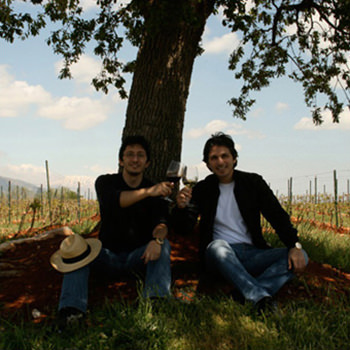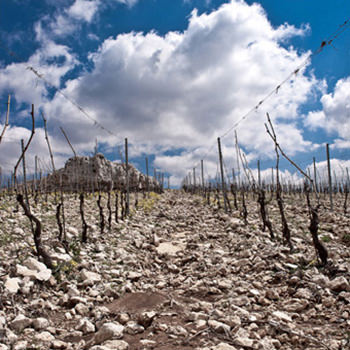Making wine during wartime is elitist. But that’s kind of the point.
“Wine is a symbol,” Sandro Saade, owner of Domaine de Bargylus in Latakia, Syria, told VinePair. Sandro co-runs the winery with his brother, Karim, “It means different things to different people, but it is almost always tied to land, people and heritage. To us, it has become a symbol of perseverance and survival.”
As most people know, Syria in the midst of a horrific, multi-sided civil war. Reports, video and pictures of the people dying of hunger in the Northern town of Madaya have shocked even the most hardened humanitarian workers, politicos and journalists, and have galvanized the public.
Don't Miss A Drop
Get the latest in beer, wine, and cocktail culture sent straight to your inbox.The United Nations reports that the Syrian government is finally allowing aid to be delivered to the opposition stronghold. More than 4.3 million Syrians have migrated according to the U.N.’s latest numbers, and many are settling in Lebanon, which shares a border with Syria. 1.1 million Syrian refugees are officially registered in Lebanon, but there are undoubtedly many more unofficial migrants. (Lebanon has a population of about 4 million, making the number of migrants entering the country especially staggering). An estimated 250,000 Syrians have died in the conflict.
In addition to violence threatening the lives of Syrian citizens, it takes little more than a cursory glance at headlines to know that the cultural heritage of Syria especially–and the surrounding regions in general–is under assault. The Baal Shamin, the grand temple Bel, and the monumental Arch of Triumph in Palymra built during the second century by the Roman Emperor Septimius Severis, are just a few of the stunning landmarks that ISIS has destroyed. Westerners are being executed. Civilians are under attack. Parents can’t feed their children.
And a bunch of rich dilettantes are futzing around with grapes? What gives?
In addition to being an embodiment of the physical land and climate, or terroir, wine is also a cheat sheet for a country’s culture, traditions and values. Almost anyone can find value in something that brings them pleasure. Winemakers in the Middle East have perhaps unintentionally cast themselves into the role of diplomat; as it happens, everyone speaks wine.
But there’s more to it. For a country in the throes of a war that defines the most basic standards of acceptable human interaction, creating wine requires incredible dedication. Dozens of people with a variety of skills and knowledge, not to mention patience and a well-trained palate, have to cooperate. When all is said and done, they are working on more than just an agricultural product: the cultivation of Syrian wine becomes a courageous attempt to hold onto the country’s humanity and its soul, and to export it to the rest of the world in a form more immediately relatable (and definitely user-friendly) than an image or headline.
 Making wine in a war zone takes a village, and an entrepreneurial zeal usually reserved for venture capitalists in Silicon Valley. Sandro and his brother, Karim, who built the Domaine de Bargylus together, haven’t been back to the vineyard for about four years. They have between 30 and 40 employees at any given time (more during harvest season), whom they communicate with via phone and, when it’s working, Internet. Before a wine is bottled, samples are sent to them in Beirut, Lebanon, where they are headquartered, in a taxi, on ice. It takes several hours one-way on a good day.
Making wine in a war zone takes a village, and an entrepreneurial zeal usually reserved for venture capitalists in Silicon Valley. Sandro and his brother, Karim, who built the Domaine de Bargylus together, haven’t been back to the vineyard for about four years. They have between 30 and 40 employees at any given time (more during harvest season), whom they communicate with via phone and, when it’s working, Internet. Before a wine is bottled, samples are sent to them in Beirut, Lebanon, where they are headquartered, in a taxi, on ice. It takes several hours one-way on a good day.
“Sometimes we delay the bottling just a day or two, sometimes longer,” Sandro says. “But we must test the wines, and quite frequently, there’s a delay.” The challenges the Saade family face make battling phylloxera look like a pleasant vineyard distraction.
The Saade brothers originally hoped to buy land in Bordeaux for their winery (they decided against it because, ironically, they didn’t want to produce wine from afar). In 2003, they chose a 12-hectare plot on the slopes of Jebel al-Ansariye (aka Mount Bargylus) in northern Syria for Domaine de Bargylus, and a plateau between Mount Lebanon and the Anti-Lebanon mountains in the Bekaa valley for their Lebanese wine, Chateau Marsyas. The grapes are grown and bottled completely separately. Their first Bargylus became available in 2006 and their first bottle of Marsyas was ready in 2007.

Their Syrian vineyard, 900 meters above sea level, has seen a lot of action. In June of 2014, two mortars ripped through it, pulverizing 15 of their Chardonnay plants. Yet despite the considerable challenges harvesting since 2011 (the vineyard workers work cautiously and quickly), and the logistical constraints (sampling from a different country, importing bottles, corks and labels from France into Lebanon and then sent to the vineyard in Syria), they still manage to produce on average, 45,000 bottles of Domaine de Bargylus – primarily reds — every year.
Bargylus wine has been greeted with unabashed, unbridled delight, which is unusual for any new winery, and especially notable for one that hails from the Middle East. Bargylus can be found on the wine menu of Michelin-starred tables in London and France, and became the first Syrian wine in history to be exhibited at the Vinexpo wine fair in Bordeaux (which French president Francois Hollande personally attended). Soon, with luck – and the FDA’s approval – Americans will be able to try it at home. Bottles of red cost about 36 euros, and are primarily made from Syrah, Cabernet Sauvignon and Merlot. The whites, Chardonnay and Sauvignon Blanc blends, run about 28 euros.
“No matter what is taking place around the vineyards, we are determined to continue,” Sandro says. “We will resist and hope for a better time in the future. It’s not just about the wine of course. Making this wine is our way of contributing to the future of Syria, almost a kind of social service by providing a place where we can employ people from surrounding villages who are as passionate about creating wine as we are. We are helping them and their families.”
The winery in Syria is one of the only sources of revenue available in Latakia, and its employees come from all walks of life, and more notably, places of worship. There are Muslims who work there, despite the reality that to be found drinking wine can mean severe punishment by members of the opposition groups. But so far, the Saades say no one has targeted their workers or their winery.
“Syria is actually a very diverse place,” Sandro, who is Christian Orthodox, says. “We don’t discuss religion with employees at our winery. We only care if our employees are passionate about wine, hard-working and interested in learning. That’s it.”
All photos courtesy of Chateau Bargylus
